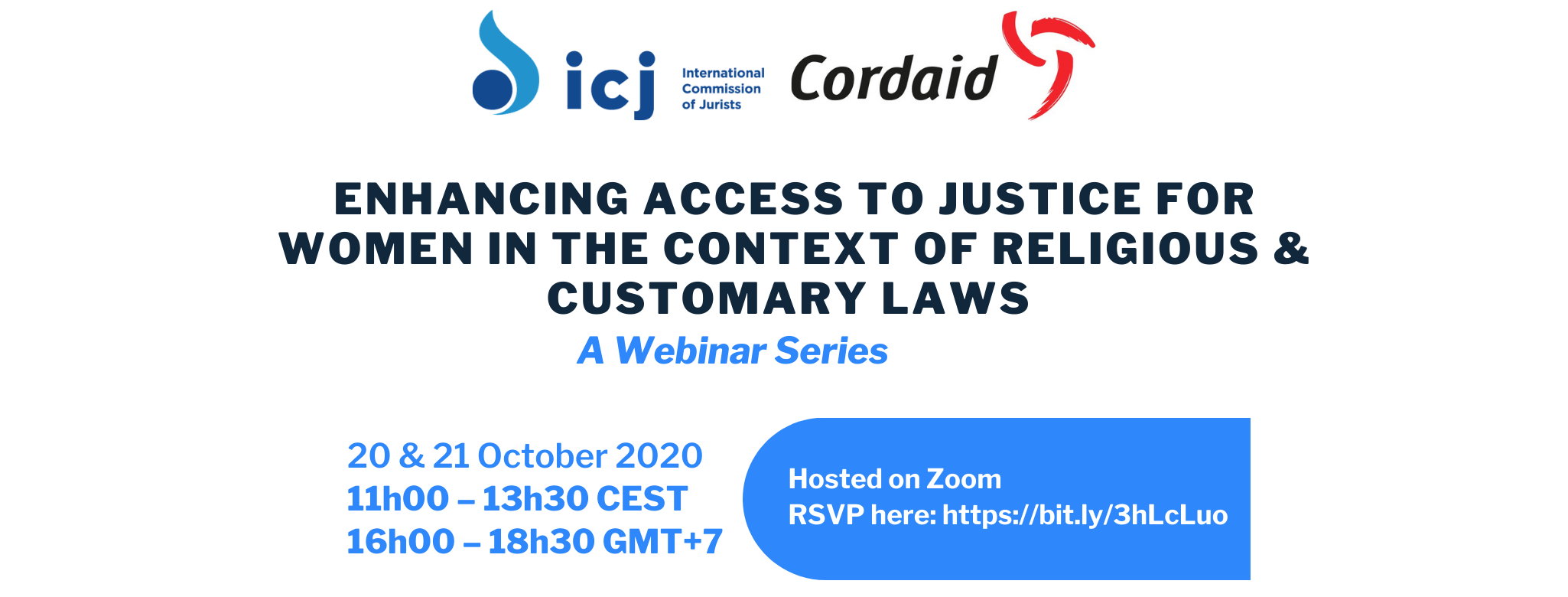The ICJ and Cordaid are convening a webinar series to foster dialogue among women human rights defenders and religious and customary justice actors.
This public online event takes place 20 & 21 October 2020 11:00-13:30 (CEST) / 16h00 – 18h30 GMT+7
Women’s empowerment in every aspect of their lives is reliant upon ensuring that systems of law and justice work for women. Over the years, many countries have seen an expansion of women’s legal entitlements and enhancement of their right to access justice; however, in many contexts, there is also a growing trend of invoking religion and custom to violate women’s human rights. It is in these contexts where laws and policies exist that expressly discriminate against women, posing a continuing serious challenge to women’s ability to access justice.
In response, Cordaid and the ICJ will convene a webinar series to foster dialogue among women human rights defenders (WHRDs) and religious and customary justice actors.
The focus of the exchange will be on ensuring the protection of women’s human rights and access to justice in contexts where religious and customary laws are prevalent, within a framework of rule of law and international human rights standards. Diverse WHRDs and religious and customary justice actors from Asia, Africa, and the Middle East and North Africa will come together in two consecutive sessions:
Webinar 1 (Oct 20): Intersections between women’s human rights and custom and religion
Webinar 2 (Oct 21): Best practices, interventions, and obligations under international human rights law to ensure access to justice in cultural and religious contexts
Both sessions will be held on Zoom with simultaneous translation in Bahasa, Dari, English and French.
Register here to participate.
A flyer for the event is available here.
Background Material
- Concept Note inBahasa, Dari, English and French
- Key questions for discussion at each webinar:
During the first webinar, the discussion will be focused on responding to the questions below:
- How do custom and religion shape the ability of women to access justice?
- Do pathways to justice based in custom and religion promote women’s human rights?
- Do you perceive a clash between women’s human rights and pathways to justice based on custom and religion? If so, how?
- Are there religious and cultural practices, which have an impact of exacerbating inequalities between men and women, and negatively affect women’s ability to defend their human rights?
- How have women created space within customary and religious law to advocate for women’s human rights?
During the second webinar, the discussion will be focused on responding to the questions below:
- What are the best practices and interventions, which can be adopted by States, international organisations and civil society to support positive impacts of custom and religion on women’s access to justice?
- What practical measures can be adopted by States, international organisations and civil society to eliminate practices, which exacerbate women’s inequality and are barriers to pathways to justice?
- What are the obligations of these actors when customary and religious law discriminate against women and prevents them from being able to defend their rights?
- How have women successfully created space for advocacy within customary and religious contexts?
- Documents:
- Cordaid Publication: Diverse Pathways to Justice for All: Supporting Everyday Justice Providers to Achieve SDG16.3
- ICJ Publication: Indigenous and other Traditional or Customary Justice Systems – Selected International Sources
- IDLO report: Navigating Complex Pathways to Justice: Women and Customary and Informal Justice System
- ICJ Publication: Access to Justice Challenges Faced by Victims and Survivors of Sexual and Gender-Based violence in Eswatini
- Human Rights Council: Report of the Special Rapporteur on freedom of Religion or Belief
- Report of the 2017 Geneva Forum on traditional and customary justice systems
- Report of the 2018 Geneva Forum on indigenous and other traditional or customary justice systems in Asia
- Report of the 2020 Geneva Forum on indigenous and other traditional or customary justice systems in Africa
- 2019 Report of the UN Special Rapporteur on the rights of indigenous peoples, on indigenous justice
- Obstacles to Women’s and Girls’ Access to Justice for Gender-based Violence in Morocco (June 2019), in English and in Arabic
- Gender-based Violence in Lebanon: Inadequate Framework, Ineffective Remedies (July 2019), in English and in Arabic
Contact
Ms Nokukhanya (Khanyo) Farisè, Legal Adviser, ICJ Africa Regional Programme, nokukhanya.farise(a)icj.org
The webinars are linked to ICJ’s broader initiatives on:




